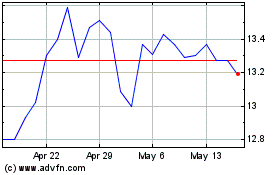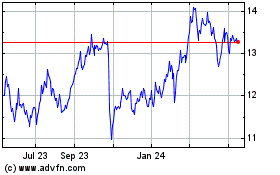The Western Union Company (NYSE: WU) announced today that its
Board of Directors approved a new $1 billion authorization for the
Company to repurchase its common stock and declared a quarterly
cash dividend of $0.235 per common share. The dividend will be
payable December 31, 2024, to stockholders of record at the close
of business on December 23, 2024.
“We remain committed to returning capital to our shareholders
with our disciplined approach focused on driving long-term
shareholder value through both dividends and stock repurchases and
today’s announcements allows us the flexibility to continue to do
that,” said Devin McGranahan, President and Chief Executive
Officer.
Repurchases may be made at management’s discretion through
open-market transactions, privately negotiated transactions, tender
offers, Rule 10b5-1 plans, or by other means. The amount and timing
of any repurchases made under the share repurchase program will
depend on a variety of factors, including market conditions, share
price, legal requirements, and other factors. The program does not
have a set expiration date and may be suspended, modified, or
discontinued at any time without prior notice.
Safe Harbor Compliance Statement for Forward-Looking
Statements
This press release contains certain statements that are
forward-looking within the meaning of the Private Securities
Litigation Reform Act of 1995. These statements are not guarantees
of future performance and involve certain risks, uncertainties, and
assumptions that are difficult to predict. Actual outcomes and
results may differ materially from those expressed in, or implied
by, our forward-looking statements. Words such as “expects,”
“intends,” “targets,” “anticipates,” “believes,” “estimates,”
“guides,” “provides guidance,” “provides outlook,” “projects,”
“designed to,” and other similar expressions or future or
conditional verbs such as “may,” “will,” “should,” “would,”
“could,” and “might” are intended to identify such forward-looking
statements. Readers of this press release of The Western Union
Company (the “Company,” “Western Union,” “we,” “our,” or “us”)
should not rely solely on the forward-looking statements and should
consider all uncertainties and risks discussed in the Risk Factors
section and throughout the Annual Report on Form 10-K for the year
ended December 31, 2023. The statements are only as of the date
they are made, and the Company undertakes no obligation to update
any forward-looking statement.
Possible events or factors that could cause results or
performance to differ materially from those expressed in our
forward-looking statements include the following: (i) events
related to our business and industry, such as: changes in general
economic conditions and economic conditions in the regions and
industries in which we operate, including global economic downturns
and trade disruptions, or significantly slower growth or declines
in the money transfer, payment service, and other markets in which
we operate, including downturns or declines related to
interruptions in migration patterns or other events, such as public
health emergencies, epidemics, or pandemics, civil unrest, war,
terrorism, natural disasters, or non-performance by our banks,
lenders, insurers, or other financial services providers; failure
to compete effectively in the money transfer and payment service
industry, including among other things, with respect to price or
customer experience, with global and niche or corridor money
transfer providers, banks and other money transfer and payment
service providers, including digital, mobile and internet-based
services, card associations, and card-based payment providers, and
with digital currencies and related exchanges and protocols, and
other innovations in technology and business models; geopolitical
tensions, political conditions and related actions, including trade
restrictions and government sanctions, which may adversely affect
our business and economic conditions as a whole, including
interruptions of United States or other government relations with
countries in which we have or are implementing significant business
relationships with agents, clients, or other partners;
deterioration in customer confidence in our business, or in money
transfer and payment service providers generally; failure to
maintain our agent network and business relationships under terms
consistent with or more advantageous to us than those currently in
place; our ability to adopt new technology and develop and gain
market acceptance of new and enhanced services in response to
changing industry and consumer needs or trends; mergers,
acquisitions, and the integration of acquired businesses and
technologies into our Company, divestitures, and the failure to
realize anticipated financial benefits from these transactions, and
events requiring us to write down our goodwill; decisions to change
our business mix; changes in, and failure to manage effectively,
exposure to foreign exchange rates, including the impact of the
regulation of foreign exchange spreads on money transfers; changes
in tax laws, or their interpretation, any subsequent regulation,
and unfavorable resolution of tax contingencies; any material
breach of security, including cybersecurity, or safeguards of or
interruptions in any of our systems or those of our vendors or
other third parties; cessation of or defects in various services
provided to us by third-party vendors; our ability to realize the
anticipated benefits from restructuring-related initiatives, which
may include decisions to downsize or to transition operating
activities from one location to another, and to minimize any
disruptions in our workforce that may result from those
initiatives; our ability to attract and retain qualified key
employees and to manage our workforce successfully; failure to
manage credit and fraud risks presented by our agents, clients, and
consumers; adverse rating actions by credit rating agencies; our
ability to protect our trademarks, patents, copyrights, and other
intellectual property rights, and to defend ourselves against
potential intellectual property infringement claims; material
changes in the market value or liquidity of securities that we
hold; restrictions imposed by our debt obligations; (ii) events
related to our regulatory and litigation environment, such as:
liabilities or loss of business resulting from a failure by us, our
agents, or their subagents to comply with laws and regulations and
regulatory or judicial interpretations thereof, including laws and
regulations designed to protect consumers, or detect and prevent
money laundering, terrorist financing, fraud, and other illicit
activity; increased costs or loss of business due to regulatory
initiatives and changes in laws, regulations and industry practices
and standards, including changes in interpretations, in the United
States and abroad, affecting us, our agents or their subagents, or
the banks with which we or our agents maintain bank accounts needed
to provide our services, including related to anti-money laundering
regulations, anti-fraud measures, our licensing arrangements,
customer due diligence, agent and subagent due diligence,
registration and monitoring requirements, consumer protection
requirements, remittances, immigration, and sustainability
reporting including climate-related reporting; liabilities,
increased costs or loss of business and unanticipated developments
resulting from governmental investigations and consent agreements
with, or investigations or enforcement actions by regulators and
other government authorities; liabilities resulting from
litigation, including class-action lawsuits and similar matters,
and regulatory enforcement actions, including costs, expenses,
settlements, and judgments; failure to comply with regulations and
evolving industry standards regarding consumer privacy, data use,
the transfer of personal data between jurisdictions, and
information security, failure to comply with the Dodd-Frank Wall
Street Reform and Consumer Protection Act, as well as regulations
issued pursuant to it and the actions of the Consumer Financial
Protection Bureau and similar legislation and regulations enacted
by other governmental authorities in the United States and abroad
related to consumer protection; effects of unclaimed property laws
or their interpretation or the enforcement thereof; failure to
maintain sufficient amounts or types of regulatory capital or other
restrictions on the use of our working capital to meet the changing
requirements of our regulators worldwide; changes in accounting
standards, rules and interpretations, or industry standards
affecting our business; and (iii) other events, such as
catastrophic events and management’s ability to identify and manage
these and other risks.
About Western Union
The Western Union Company (NYSE: WU) is committed to helping
people around the world who aspire to build financial futures for
themselves, their loved ones and their communities. Our leading
cross-border, cross-currency money movement, payments and digital
financial services empower consumers, businesses, financial
institutions and governments—across more than 200 countries and
territories and nearly 130 currencies—to connect with billions of
bank accounts, millions of digital wallets and cards, and a global
footprint of hundreds of thousands of retail locations. Our goal is
to offer accessible financial services that help people and
communities prosper. For more information, visit
www.westernunion.com.
WU-G
View source
version on businesswire.com: https://www.businesswire.com/news/home/20241213394701/en/
Media Relations: Brad Jones media@westernunion.com
Investor Relations: Tom Hadley
WesternUnion.IR@westernunion.com
Western Union (NYSE:WU)
Historical Stock Chart
From Jan 2025 to Feb 2025

Western Union (NYSE:WU)
Historical Stock Chart
From Feb 2024 to Feb 2025
